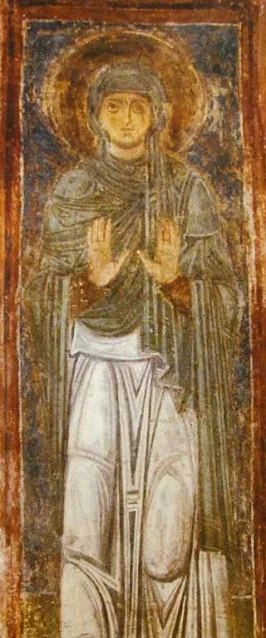In the Byzantine Rite, today is the feast St Macrina (327 ca. – 379), the older sister of Ss Basil the Great and Gregory of Nyssa. She is traditionally given the epithet “the Younger” to distinguish her from their sainted paternal grandmother, who was a disciple of St Gregory the Wonderworker. Their parents, Basil the Elder and Emmelia, their brother Peter, bishop of Sebaste, and another brother named Naucratius are all also Saints, and all but the last of them are named in the Roman Martyrology. (right: an 11th-century fresco of St Macrina in the cathedral of Holy Wisdom in Kyiv, Ukraine; public domain image from Wikimedia Commons.)
Her brother Gregory wrote two works about her, one, a general account of her life, and the other, a work titled “A Dialogue on the Soul and the Resurrection.” The latter is modeled on Plato’s Phaedo, the account of Socrates’ conversation on the nature of the soul with a student of that name, which takes place as he is in prison and awaiting execution. St Gregory’s work is cast as a conversation which he had with Macrina as she lay on her deathbed, and it says a great deal about what a change Christianity had brought to the world that the protagonist of a philosophical work of this kind could be a woman. (The same change is also evidenced by the participation of St Augustine’s mother St Monica, who was rather less educated than Macrina, in his Cassiciacum Dialogues.)When she was young, her father had arranged a marriage for Macrina, but her fiancé died before the wedding could take place, and she decided that she preferred to not marry, and dedicate her life entirely to Christ. (That a woman could make such a choice at all is also a very significant change from the pagan world.) Not long after, the elder Basil died, and she devoted her life to caring for her mother, and assisting her in raising the younger children. Together with several other women, they withdrew to a country estate owned by their family, and lived as a religious community. Naucratius had renounced a promising career as a rhetorician in order to live nearby in solitude and poverty, and take care of the local poor, but in 357, he and a servant were both killed in a hunting accident. This profoundly upset their mother Emmelia, and St Gregory shows us Macrina as her mother’s chief support in her grief.
“…then above all, the sublime and exalted soul of the young girl made itself manifest, because her nature also experienced its own suffering; for it was… her most beloved brother, who had been snatched away by death … Nevertheless, she rose above nature, and by means of her own reasoned reflections she lifted her mother up together with her and placed her beyond suffering, guiding her to patience and courage by her own example.”
St Gregory’s description of Macrina’s death, six-and-a-half months after St Basil’s, is particularly beautiful, and contains a famous reference to the hymn Phos Hilaron. (Basil himself mentions the use of this hymn as already a long-standing custom in their time.)
“Most of the day had already passed and the sun was starting to set. … the more (Macrina) neared her departure, the more she contemplated the beauty of the bridegroom and longed to rush impulsively to her beloved. She no longer spoke to us who were present, but to that One alone upon whom she held her eyes intently. … Meanwhile, evening had come on and a light had been brought in. At once Macrina opened her eyes wide, directed their attention to the gleam of light, and made it clear that she also wished to say the evening prayer of thanksgiving; but as her voice failed her, she realized her desire in her heart… When she had completed the prayer of thanksgiving and, by bringing her hand to her face for the sign of the cross, had indicated that she had finished her prayer, she took a strong, deep breath, and with that she died.”
The Phos Hilaron is still sung every day at Vespers in the Byzantine Rite. In this first video, it is sung in Greek at the Iveron Monastery on Mt Athos.
A polyphonic setting in Church Slavonic by the composer Artemy Vedel (1767-1808).

